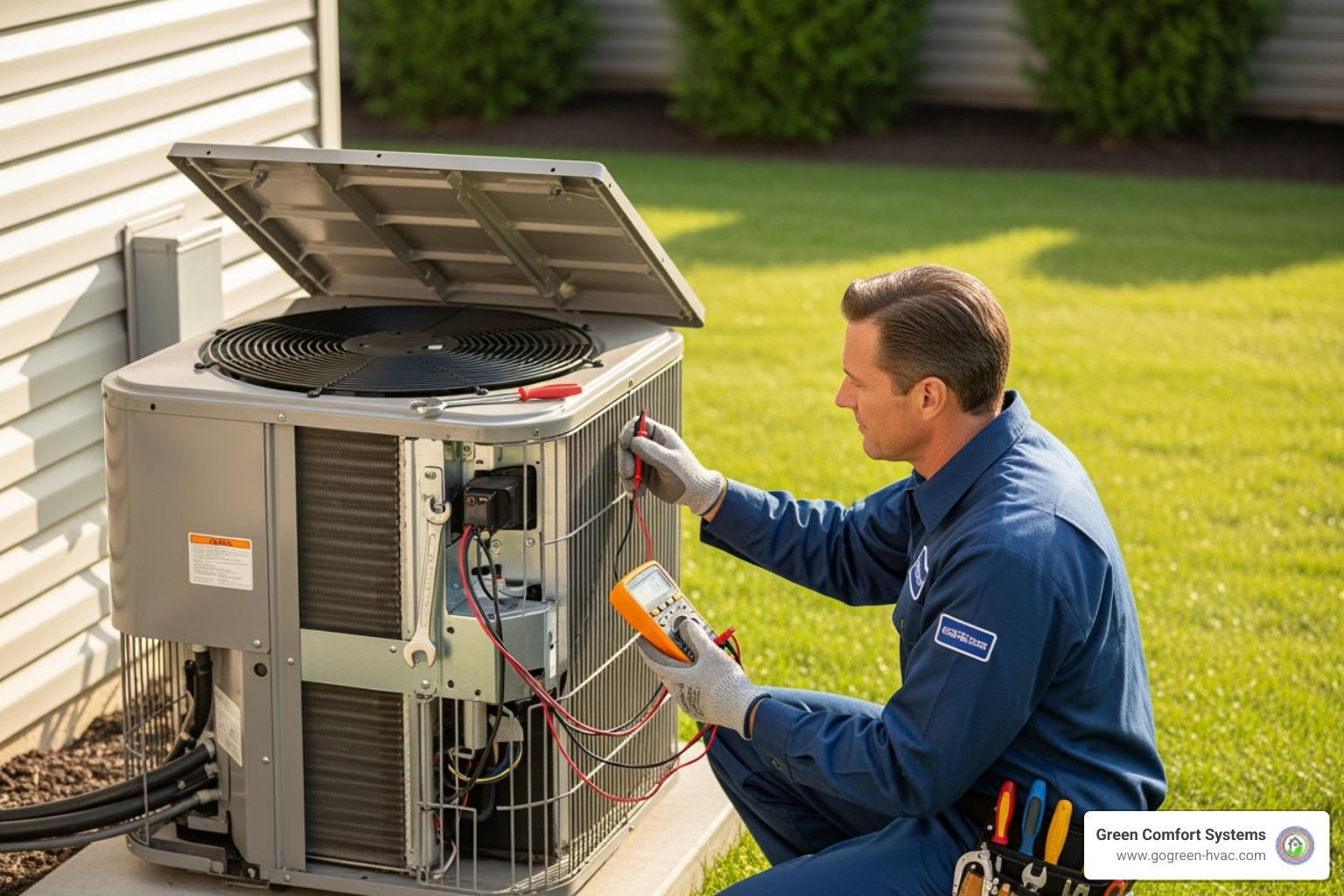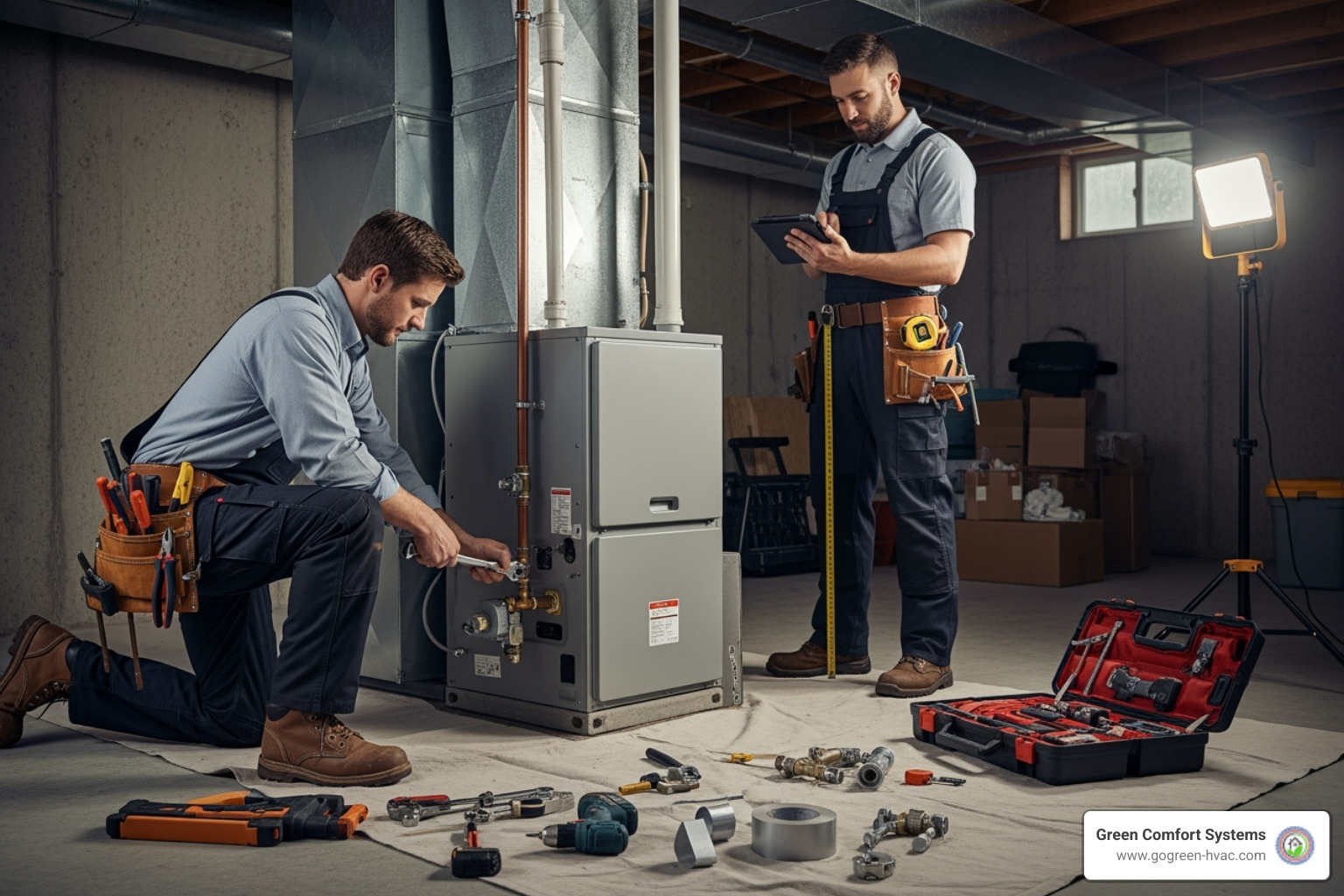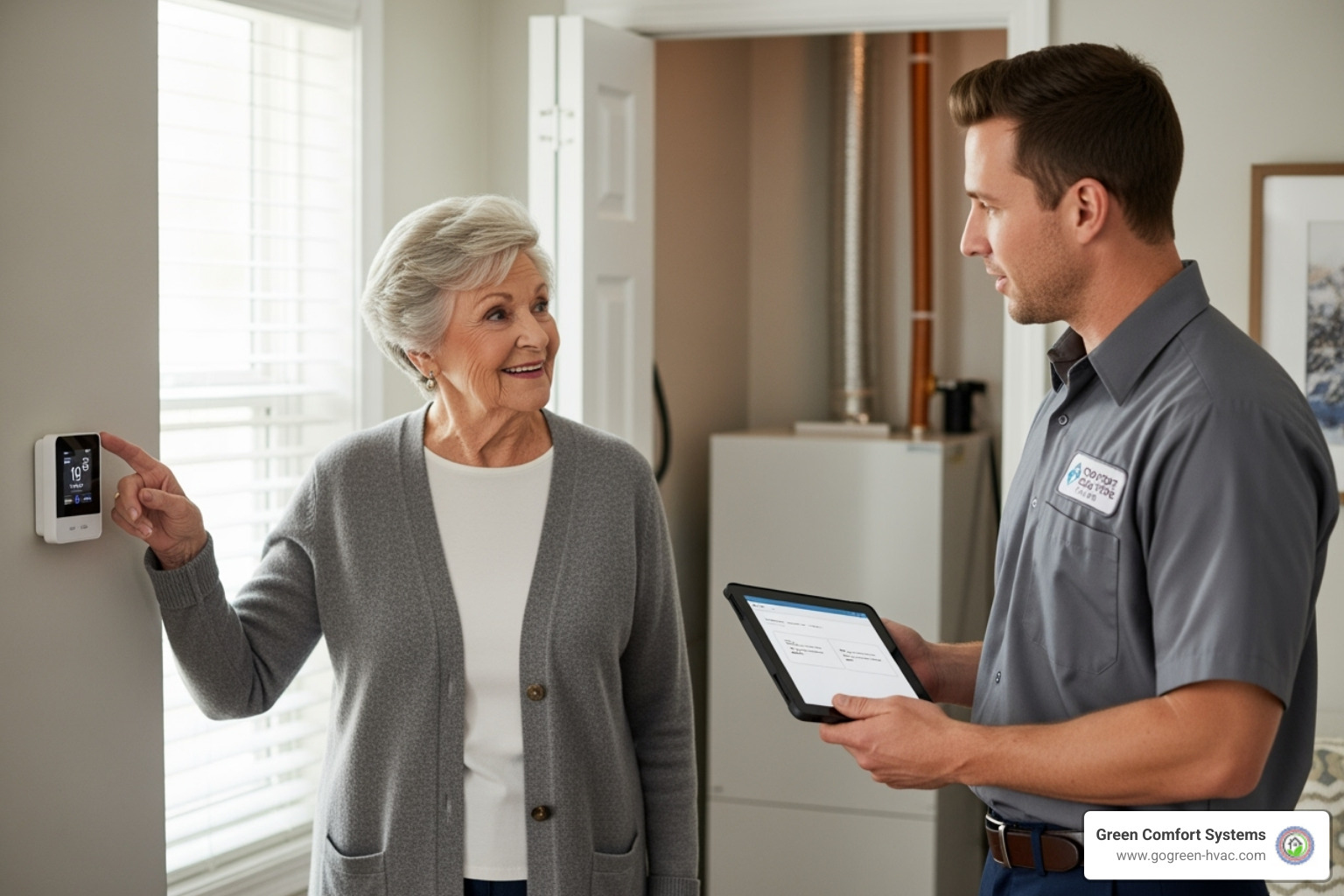Heating Upgrades: Your Guide to a Cozier, Greener Home

Why Your Home's Heating System Matters More Than You Think
Choosing a new heating system is a major decision for your home's comfort and budget. Here's a quick overview:
Top heating system options for 2024:
- Heat pumps - Most energy-efficient, work for heating and cooling
- High-efficiency furnaces - Fast heating, lower upfront costs
- Boilers - Consistent heat, longer lifespan
- Hybrid systems - Combine efficiency with reliability
Key factors to consider:
- Your home's size and insulation quality
- Local climate conditions
- Available fuel sources (gas, electric, oil)
- Upfront costs vs. long-term savings
Did you know heating is your home's biggest energy expense? It typically accounts for about 29% of your utility bill.
The good news is that a modern, efficient system, combined with proper insulation, can cut your energy bill by about 30% and reduce your environmental impact.
Today's heating systems are smarter and more efficient than ever. Whether you're replacing an old furnace or seeking an eco-friendly upgrade, the right choice can significantly improve your home's comfort and save you money.
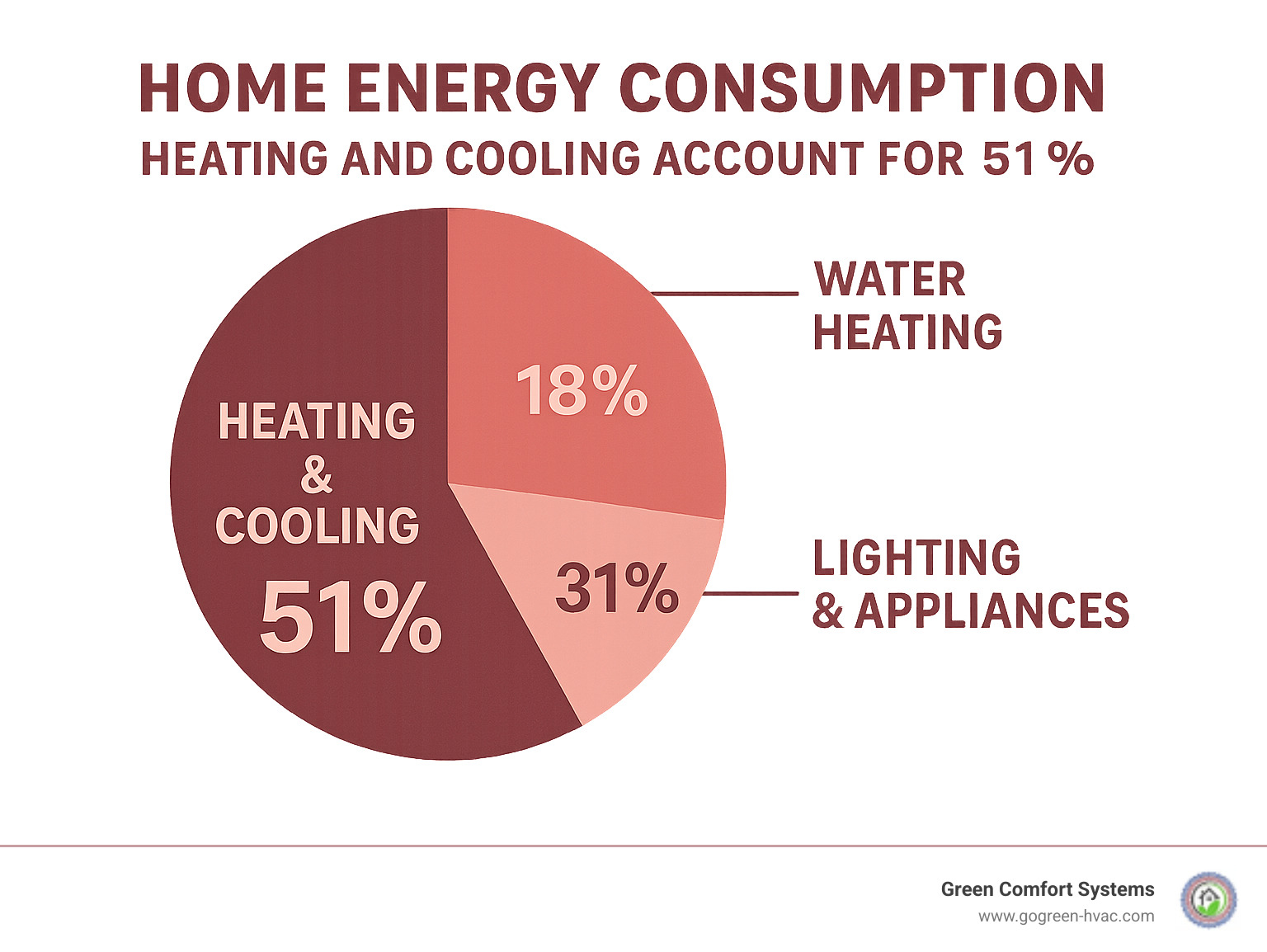
Is It Time for an Upgrade? 8 Telltale Signs
Even the most reliable heating system won't last forever. Recognizing the warning signs of failure can save you from a cold-night emergency and a rushed, costly replacement. Planning for a new heating system allows you to make a smart, unhurried decision.
Rising utility bills are often the first hint. If your energy costs are climbing without a change in your habits, your system is losing efficiency. An unmaintained system can lose 5% efficiency annually, causing bills to add up quickly.
Frequent repairs are another red flag. If repair bills are piling up, they can quickly approach the cost of a new, reliable system.
System age is a key factor. Furnaces last 15-20 years, boilers 20-30, and heat pumps 10-15. As systems age, their efficiency drops and the risk of a major failure increases.
Strange noises from your heating system are never a good sign. Banging, screeching, or whistling sounds are cries for help. A loud bang when the furnace starts could signal a cracked heat exchanger, a serious safety hazard requiring immediate attention.
Uneven heating throughout your home is frustrating. If some rooms are hot while others are cold, your system is no longer distributing heat effectively, possibly due to age, size, or ductwork issues.
Poor air quality is a real concern. An old system can worsen indoor air quality by circulating dust and allergens. If allergies or respiratory issues spike in winter, your heating system could be to blame.
Carbon monoxide risk is the most serious warning sign. A cracked heat exchanger in a gas furnace can leak deadly carbon monoxide. Unexplained headaches, dizziness, or nausea in winter demand an immediate professional inspection.
Short cycling—when your system turns on and off frequently without completing a full cycle—puts immense stress on components, shortening the system's life and increasing energy costs.
Spotting these signs early allows you to research and choose the right new heating system without pressure, ensuring a wise investment for your home.
Ready to explore your options? Learn more about the benefits and drawbacks of installing a heat pump.
Exploring Modern Heating Systems: Finding Your Perfect New Heating System
Shopping for a new heating system means choosing your home's comfort engine. Today's options are far more efficient than older models. To compare them, you'll see ratings like AFUE (for furnaces/boilers) and HSPF/COP (for heat pumps)—higher numbers mean greater savings.
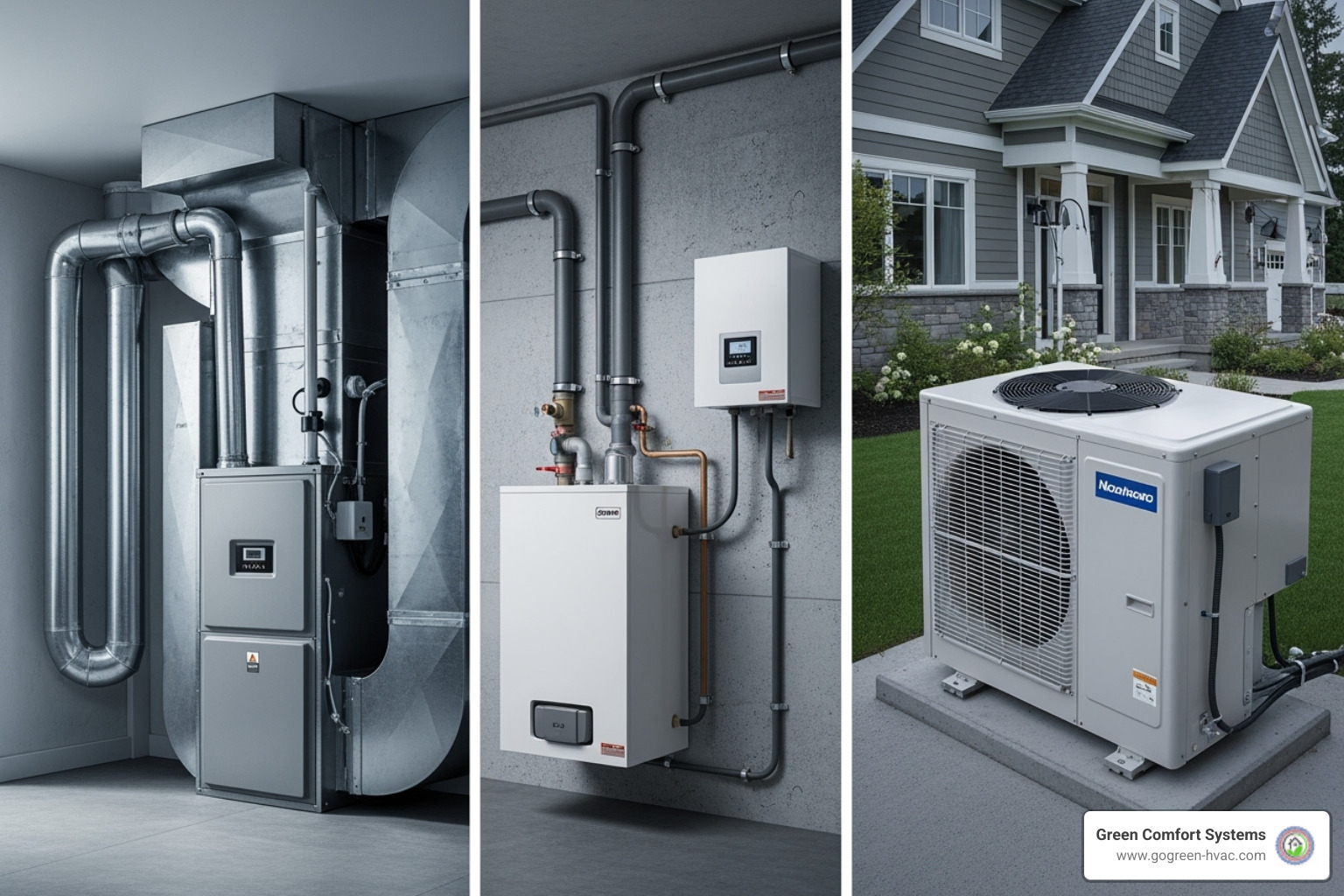
The "perfect" system depends on your home, climate, and priorities, whether it's fast heating, eco-friendliness, or consistent warmth. Let's explore the main types so you can make the best choice for your family.
Furnaces
Furnaces are the traditional workhorses of home heating, delivering fast and powerful warmth by pushing heated air through ducts. They typically run on natural gas, but propane and oil options are also available.
Pros: Furnaces provide rapid heating and generally have a lower upfront installation cost, especially if you already have ductwork.
Cons: They can lose efficiency through leaky or poorly insulated ducts and may circulate dust and allergens, which can be an issue for those with respiratory sensitivities.
For more detailed information about furnaces, you can check out this comprehensive resource on Furnaces.
Boilers and Radiant Heat
Boilers provide a gentle, consistent warmth through radiant heat by circulating hot water or steam through radiators, baseboard heaters, or in-floor tubing. This method heats objects directly, creating an even, dust-free comfort. Modern condensing boilers are highly efficient, and options like electric underfloor heating offer luxurious comfort.
Pros: Radiant heat is exceptionally comfortable, even, and doesn't circulate allergens.
Cons: These systems are slower to respond to temperature changes and typically have a higher and more complex installation cost.
Heat Pumps: The All-in-One Solution
Heat pumps are the all-in-one solution for home comfort, providing both heating and cooling in a single, highly efficient unit. Instead of burning fuel, they move heat—transferring it from the outside air into your home in winter, and out of your home in summer.
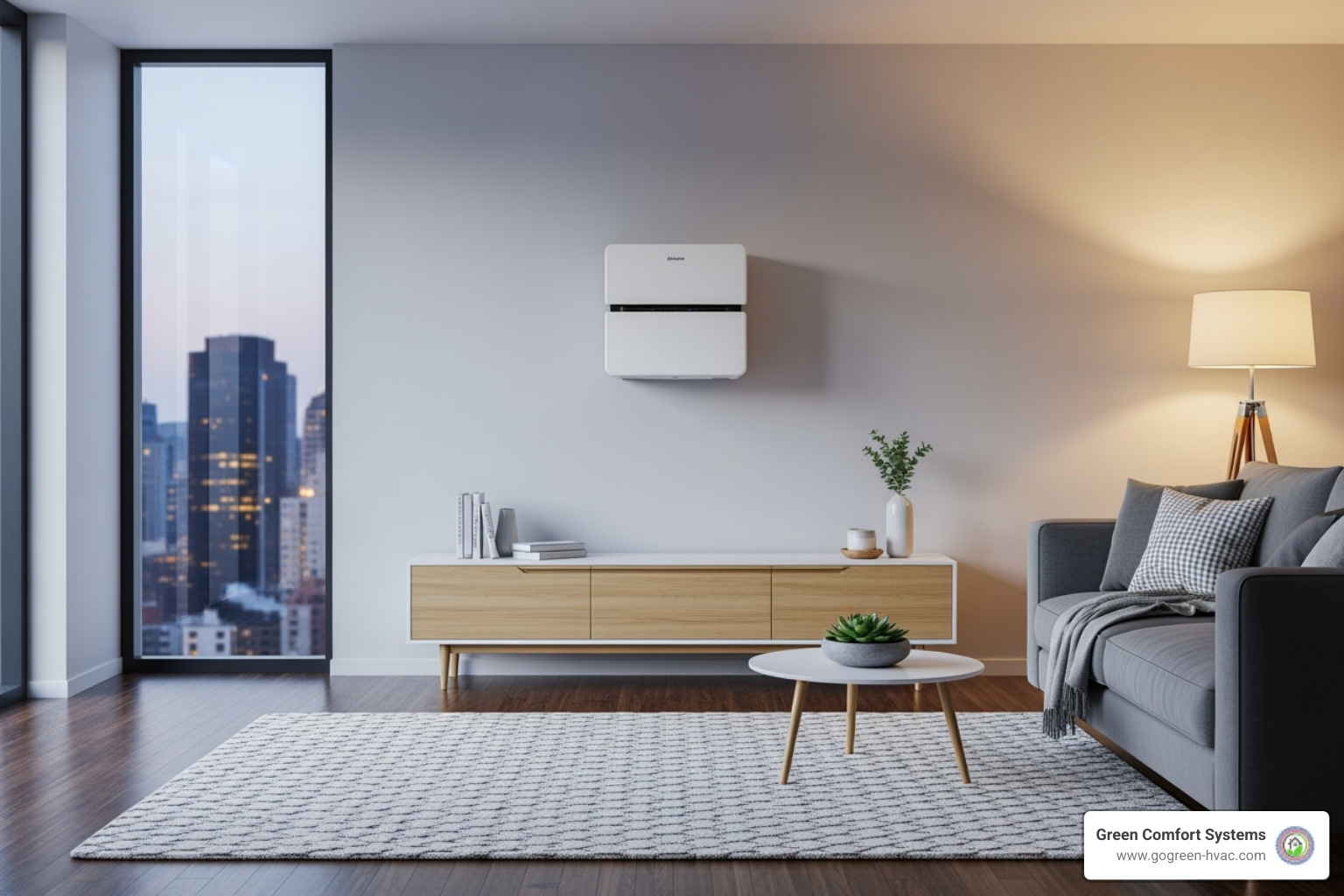
Types include common air-source models, ultra-efficient geothermal systems, and flexible ductless mini-splits for room-by-room control.
Pros: Heat pumps are incredibly energy-efficient, eco-friendly, and consolidate heating and cooling.
Cons: They have a higher upfront cost, and while modern units work well in the cold, their efficiency can decline in extreme freezing temperatures.
You can learn more about these versatile systems at heat pumps.
[TABLE] Comparing Heating System Options
| System Type | Average Installation Cost | Average Lifespan | Key Benefit | Key Drawback |
|---|---|---|---|---|
| Furnace | Moderate | 15-20 years | Fast, powerful heating | Can lose heat through ducts, circulates dust |
| Boiler/Radiant Heat | High | 20-30 years | Consistent, even, dust-free heat | Slower to heat, higher upfront cost |
| Heat Pump | High | 10-15 years | Extremely energy-efficient, heats & cools | Higher initial cost, performance can vary with extreme cold |
Key Factors When Choosing Your System
Choosing a new heating system is a long-term investment in your home's comfort and efficiency. To find the right fit, several factors must be considered:
- Home Size & Insulation: The system must be correctly sized for your home's square footage and insulation level to operate efficiently.
- Local Climate: Your region's average winter temperatures will determine which systems are most effective.
- Budget: Consider both the upfront installation cost and the long-term operational savings.
- Fuel Sources: Your options depend on available fuels like natural gas, electricity, propane, or oil.
- Environmental Impact: For those looking to reduce their carbon footprint, electric heat pumps are a leading choice.
Understanding the Cost of a New Heating System
The total cost of a new heating system involves more than the sticker price. It's crucial to consider two components:
- Installation Costs: This is the upfront price, including the equipment, labor, and any necessary modifications to ductwork or electrical systems.
- Long-Term Running Costs: This is where efficiency pays off. Since heating can account for about 29% of your energy bill, a high-efficiency model can generate significant savings over its lifespan, often paying back its higher initial cost.
Don't forget to look for government incentives and rebates, which can substantially lower the upfront investment for qualifying high-efficiency systems.
Matching Your System to Your Climate
Your local climate is a critical factor in selecting the right new heating system.
- Cold Climates: High-efficiency furnaces and boilers are reliable choices. However, modern cold-climate heat pumps are now excellent alternatives, and geothermal systems offer best performance in freezing temperatures.
- Moderate Climates: Air-source heat pumps are ideal, efficiently handling both heating and cooling needs throughout the year.
- Variable Climates with Cold Winters: A hybrid system offers the best of both worlds. It pairs an electric heat pump for milder weather with a backup gas furnace for deep freezes, maximizing efficiency without sacrificing comfort.
Here in Maryland, where winters can be intense, we help homeowners weigh upfront costs against long-term energy savings to find a system that delivers reliable warmth and value.
Maximizing Efficiency and Longevity
A new heating system is a great start, but a "whole-house approach" open ups its full potential for savings and longevity. By combining your new unit with proper insulation, air sealing, and regular maintenance, you create a truly energy-efficient home. This holistic strategy reduces the workload on your system, extending its lifespan and maximizing your home's energy efficiency.
The Role of Smart Technology
Smart technology can significantly improve your new heating system's performance and convenience.
- Smart Thermostats: These devices learn your schedule, adjusting the temperature automatically to save energy when you're out and ensure comfort when you're home. Most offer remote control via smartphone.
- Zoned Heating: By using systems like smart valves for radiators or dampers in ductwork, you can create zones to heat only the rooms you're using, preventing energy waste.
- Smart Features: Advanced features like geolocation can use your phone's location to automatically adjust the heat, providing seamless comfort and savings.
Essential Maintenance for Your New Heating System
Regular maintenance is crucial for the efficiency and longevity of your new heating system. Neglecting it can lead to breakdowns on the coldest days. Key tasks include:
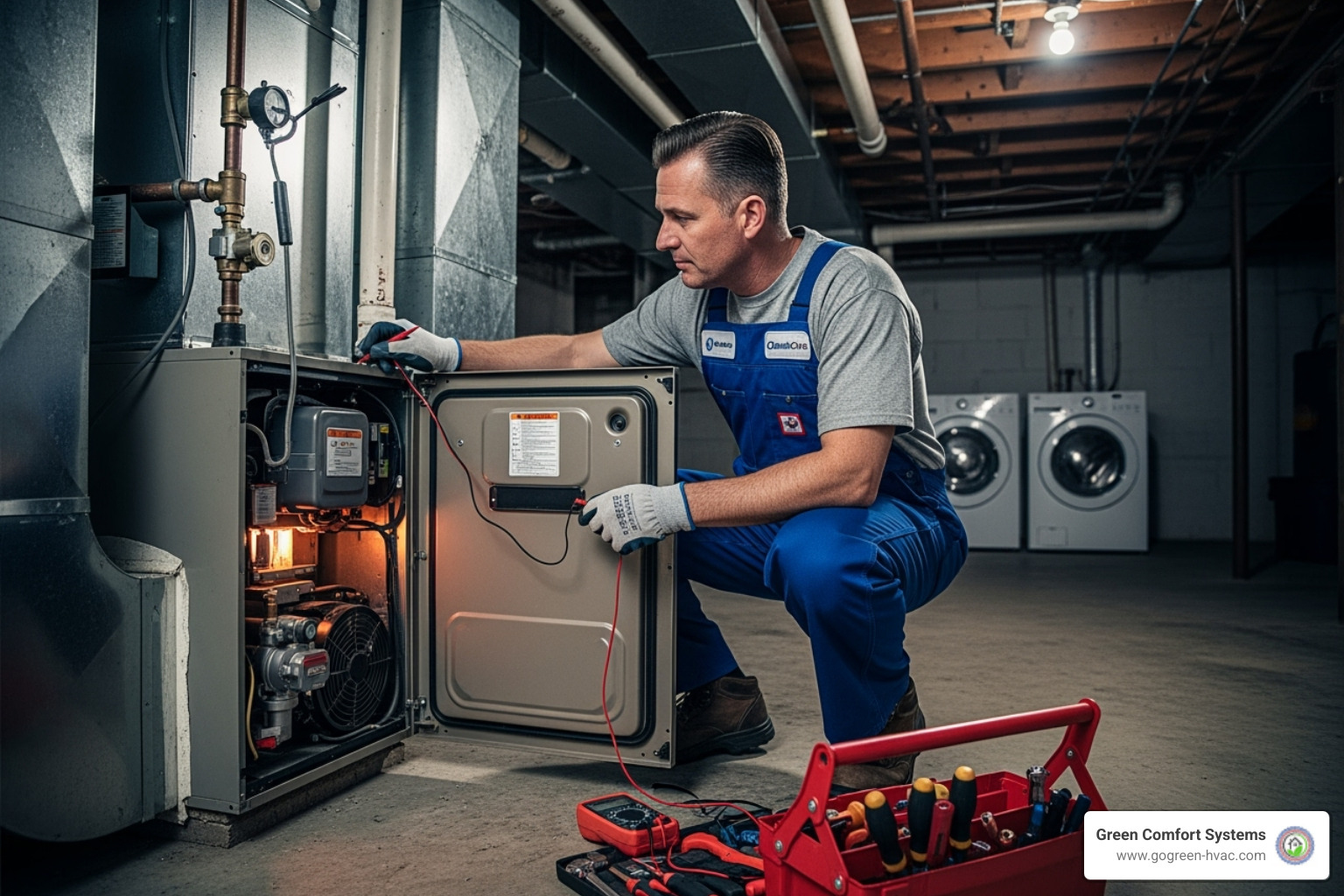
- Annual Tune-Ups: Schedule a professional inspection each fall before the heating season begins. A technician will clean and inspect components, ensuring safe and efficient operation and preventing major repairs.
- Filter Changes: For forced-air systems, check filters monthly and replace them every 1-3 months. A clean filter improves airflow and reduces energy consumption.
- Duct Cleaning: Periodically cleaning your ductwork can improve air quality and system efficiency by removing built-up dust and allergens.
- Professional Inspections: If you notice strange noises, smells, or poor performance, call for an inspection. For gas systems, always use a qualified professional, as recommended by safety guides like Energy Safe Victoria’s guide to heating your home with gas.
The Future of Home Heating: Innovations and Trends
The future of home heating is focused on sustainability and efficiency. Exciting innovations are emerging that promise to make your next new heating system even smarter and greener. Here are some key trends to watch:
- Zeolite Hybrid Boilers: These systems use a mineral stone (zeolite) that releases heat when it absorbs water vapor. Paired with a solar collector, they offer highly efficient, low-emission heating.
- Micro-Cogeneration: Also known as Micro-CHP (Combined Heat and Power), these units generate both heat and electricity from a single source like natural gas, acting as a mini power plant for your home.
- Advanced Air-to-Water Heat Pumps: The next generation of these systems offers an excellent, fossil-fuel-free replacement for traditional boilers. They provide efficient hydronic heating and can also supply domestic hot water, with significant energy savings.
- Solar Thermal Integration: Solar thermal panels capture the sun's energy to heat water. They can be integrated with other systems, like high-efficiency boilers, to create a hybrid solution that dramatically reduces fuel consumption.
- Vacuum Heating: This technology updates older steam heating systems. By using low-temperature steam in a vacuum, it can significantly improve the efficiency of existing radiator systems.
These innovations, combined with smart home integration, are paving the way for heating systems that are more sustainable, cost-effective, and comfortable than ever.
Frequently Asked Questions about New Heating Systems
Choosing a new heating system is a big decision. Here are answers to some of the most common questions we hear:
Which heating system is the most energy-efficient?
Geothermal heat pumps are the most energy-efficient systems available, using stable underground temperatures for heating and cooling. However, for most homes, high-efficiency air-source heat pumps are the top choice. They don't burn fuel; they simply move existing heat, making them incredibly efficient. Modern high-efficiency furnaces and condensing boilers are also excellent options, particularly for homes with natural gas.
The "most efficient" system for you depends on your local climate, home insulation, and available fuel sources.
How long should a new heating system last?
The lifespan of a new heating system varies by type:
- Furnaces: 15-20 years
- Boilers: 20-30 years
- Heat Pumps: 10-15 years (they also provide cooling, so they run year-round)
The single most important factor for longevity is regular maintenance. An annual professional tune-up prevents wear and tear, maintains efficiency, and can significantly extend the life of your equipment.
Can a new heating system increase my home's value?
Yes, a new heating system can significantly increase your home's value. Today's buyers prioritize energy efficiency to save on utility bills. A new, modern system provides peace of mind, assuring them they won't face imminent replacement costs or repairs. As noted by experts at HVAC Boss, improved comfort, reliability, and lower running costs make a new HVAC system a highly attractive feature and a smart investment.
Conclusion
Choosing a new heating system is a significant investment in your family's comfort, your finances, and the environment. The right system—whether it's a high-efficiency furnace, a durable boiler, or a versatile heat pump—delivers lower energy bills, better air quality, and a smaller carbon footprint. The key is finding the perfect match for your home and lifestyle.
At Green Comfort Systems, we are passionate about creating cozier, greener homes. We deliver fast, reliable HVAC services that blend customer comfort with environmental responsibility—we even plant trees for every service and installation. We are proud to serve homeowners throughout Maryland, including Rosedale, Baltimore, Catonsville, Dundalk, Ellicott City, Forest Hill, Glen Burnie, Halethorpe, Joppa, Middle River, Perry Hall, Severna Park, and Towson. Our mission is to ensure your home is a haven of comfort and efficiency.
Ready to upgrade your comfort and accept a more efficient future? Explore our furnace installation services in Ellicott City, MD.
Book Expert Service Or Contact Us
Other Blogs





Get Financing Today
Get the comfort you deserve, without the financial stress.

Latest Blogs







